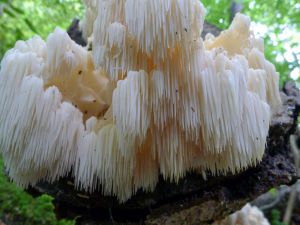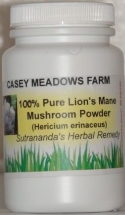Lion’s mane mushrooms, also known as hou
tou gu or yamabushitake,
are large, white, shaggy mushrooms that resemble a
lion’s mane as they grow.
They have both culinary and medical uses in Asian
countries like China, India, Japan and Korea.
Lion’s mane mushrooms contain bioactive substances
that have beneficial effects on the body, especially
the brain, heart and gut.
The natural fungus is a powerful medicinal mushroom.
The Chinese have used it for centuries as a
traditional medicine.
Traditionally grown in China, North America, Japan
and some parts of Europe, Lion’s Mane is gaining
popularity around the globe as a means to enhance
cognitive functioning and neuron growth and repair.

The brain’s ability to grow and form new connections
typically declines with age, which may explain why
mental functioning gets worse in many older adults.
Studies have found that lion’s mane mushrooms contain
two special compounds that can stimulate the growth of
brain cells: hericenones and erinacines.
Additionally, animal studies have found that lion’s mane
may help protect against Alzheimer’s disease, a
degenerative brain disease that causes progressive
memory loss.
In fact, lion’s mane mushroom and its extracts have been
shown to reduce symptoms of memory loss in mice, as well
as prevent neuronal damage caused by amyloid-beta
plaques, which accumulate in the brain during
Alzheimer’s disease (
While no studies have analyzed whether lion’s mane
mushroom is beneficial for Alzheimer’s disease in
humans, it appears to boost mental functioning.
A study in older adults with mild cognitive impairment
found that consuming 3 grams of powdered lion’s mane
mushroom daily for four months significantly improved
mental functioning, but these benefits disappeared when
supplementation stopped .
The ability of lion’s mane mushroom to promote nerve
growth and protect the brain from Alzheimer’s-related
damage may explain some of its beneficial effects on
brain health.
2. Helps Relieve Mild Symptoms of Depression and Anxiety
Up to one-third of people living in developed countries
experience symptoms of anxiety and depression .
While there are many causes of anxiety and depression,
chronic inflammation could be a major contributing
factor.
New animal research has found that lion’s mane mushroom
extract has anti-inflammatory effects that can reduce
symptoms of anxiety and
depression in mice .
Other animal studies have found that lion’s mane extract
can also help regenerate brain cells and improve the
functioning of the hippocampus, a region of the brain
responsible for processing memories and emotional
responses .
Researchers believe that improved functioning of the
hippocampus may explain the reductions in anxious and
depressive behaviours in mice given these extracts.
While these animal studies are promising, there is very
little research in humans.
One small study in menopausal women found that eating
cookies containing lion’s mane mushrooms daily for one
month helped reduce self-reported feelings of irritation
and anxiety.
3. May Speed Recovery from Nervous System Injuries
The nervous system consists of the brain, spinal cord
and other nerves that travel throughout the body. These
components work together to send and transmit signals
that control almost every bodily function.
Injuries to the brain or spinal cord can be devastating.
They often cause paralysis or loss of mental functions
and can take a long time to heal. However, research has
found that lion’s mane mushroom extract may help speed
recovery from these types of injuries by stimulating the
growth and repair of nerve cells .
In fact, lion’s mane mushroom extract has been shown to
reduce recovery time by 23–41% when given to rats with
nervous system injuries .
Lion’s mane extract may also help reduce the severity of
brain damage after a stroke. In one study, high doses of
lion’s mane mushroom extract given to rats immediately
after a stroke helped decrease inflammation and reduce
the size of stroke-related brain injury by 44%.
Ulcers are capable of forming anywhere along the
digestive tract, including the stomach, small intestine
and large intestine.
Stomach ulcers are
often caused by two major factors: overgrowth
of a bacteria called H.
pylori and
damage to the mucous layer of the stomach that’s often
due to long-term use of non-steroidal anti-inflammatory
drugs (NSAIDs).
Lion’s mane extract may protect against the development
of stomach ulcers by inhibiting the growth of H.
pylori and
protecting the stomach lining from damage .
Several studies have found that
lion’s mane extract can prevent the growth of H.
pylori in
a test tube, but no studies have tested whether they
have the same effects inside the stomach .
Additionally, an animal study found that lion’s mane
extract was more effective at preventing alcohol-induced
stomach ulcers than traditional acid-lowering drugs —
and without any negative side effects .
Lion’s mane extract can also reduce inflammation and
prevent tissue damage in other areas of the intestines.
In fact, they may help treat inflammatory bowel diseases
like ulcerative colitis and Crohn’s disease.
Major risk factors for heart disease include obesity,
high triglycerides, large amounts of oxidized
cholesterol and an increased tendency to get blood
clots.
Research shows that lion’s mane extract can influence
some of these factors and reduce the risk of heart
disease. Studies in rats and mice have found that lion’s
mane mushroom extract improves fat metabolism and lowers
triglyceride levels .
One study in rats fed a high-fat diet and given daily
doses of lion’s mane extract observed 27% lower
triglyceride levels and 42% less weight gain after 28
days .
Since obesity and high triglycerides are both considered
risk factors for heart disease, this is one way that
lion’s mane mushrooms contribute to heart health.
Test-tube studies have also found that lion’s mane
extract can help prevent the oxidation of cholesterol in
the bloodstream .
Oxidized cholesterol molecules tend to attach to the
walls of arteries, causing them to harden and increasing
the risk of heart attack and stroke. Therefore, reducing
oxidation is beneficial for heart health.
What’s more, lion’s mane mushrooms contain a compound
called hericenone B, which can decrease the rate of
blood clotting and lower the risk of heart attack or
stroke .
Diabetes is a disease that occurs when the body loses
the ability to control blood sugar levels. As a result,
levels are consistently elevated.
Chronically high blood sugar levels eventually cause
complications like kidney disease, nerve damage in the
hands and feet and vision loss.
Lion’s mane mushroom may be beneficial
for diabetes management by
improving blood sugar control and reducing some of these
side effects.
Several animal studies have shown that lion’s mane can
cause significantly lower blood sugar levels in both
normal and diabetic mice, even at daily dosages as low
as 2.7 mg per pound (6 mg per kg) of body weight .
One way that lion’s mane lowers blood sugars is by
blocking the activity of the enzyme alpha-glucosidase,
which breaks down carbs in the small intestine .
When this enzyme is blocked, the body is unable to
digest and absorb carbs as effectively, which results in
lower blood sugar levels.
In addition to lowering
blood sugars,
lion’s mane extract may reduce diabetic nerve pain in
the hands and feet.
In mice with diabetic
nerve damage, six weeks of daily lion’s mushroom extract
significantly reduced pain, lowered blood sugar levels
and even increased antioxidant levels.
Cancer occurs when DNA becomes damaged and causes cells
to divide and replicate out of control.
Some research suggests that lion’s mane mushroom has
cancer-fighting abilities, thanks to several of its
unique compounds .
In fact, when lion’s mane extract is mixed with human
cancer cells in a test tube, they cause the cancer cells
to die at a faster rate. This has been demonstrated with
several types of cancer cells, including liver, colon,
stomach and blood cancer cells .
However, at least one study has failed to replicate
these results, so more studies are needed .In addition
to killing cancer cells, lion’s mane extract has also
been shown to slow the spread of cancer. One study in
mice with colon cancer found that taking lion’s mane
extract reduced the spread of cancer to the lungs by 69%
.
Another study found that lion’s mane extract was more
effective than traditional cancer medications at slowing
tumor growth in mice, in addition to having fewer side
effects .
However, the anti-cancer effects of lion’s mane mushroom
have never been tested in humans, so more research is
needed.
Chronic inflammation and oxidative stress are believed
to be at the root of many modern illnesses, including
heart disease, cancer and autoimmune disorders .Research
shows that lion’s mane mushrooms contain powerful
anti-inflammatory and antioxidant compounds that may
help reduce the impact of these illnesses .In fact, one
study examining the antioxidant abilities of 14
different mushroom species found that lion’s mane had
the fourth highest antioxidant activity and recommended
it be considered a good dietary source of antioxidants .Several
animal studies have found that lion’s mane extract
reduced markers of inflammation and oxidative stress in
rodents and may be especially useful in the management
of inflammatory bowel disease, liver damage and stroke .Lion’s
mane mushrooms may also help reduce some of the health
risks associated with obesity, as they have been shown
to decrease the amount of inflammation released by fat
tissue .
A strong immune system protects the body from bacteria,
viruses and other disease-causing pathogens.
On the other hand, a weak immune system puts the body at
a higher risk of developing infectious diseases. Animal
research shows that lion’s mane mushroom can boost
immunity by increasing the activity of the intestinal
immune system, which protects the body from pathogens
that enter the gut through the mouth or nose .
These effects may partly be due to beneficial changes in
gut bacteria that stimulate the immune system .
One study even found that supplementing with lion’s mane
extract daily nearly quadrupled the lifespan of mice
injected with a lethal dose of salmonella bacteria .
The immune-boosting effects of lion’s mane mushrooms are
very promising, but this area of research is still
developing.
Side Effects
There are not many known or reported side effects when
it comes to Lion’s Mane. The main side effect that users
have is itchy skin.
As long as the itchy skin doesn’t come with swollen
glands, hives, or any other indication of an allergic
reaction, chances are it’s just the sign of increased
NGF.(Nerve growth factor) While uncomfortable, the itchy
skin is a sign that you are increasing your supply of
NGF and the Lion’s Mane is working. Some users have also
reported allergic reactions to Lion’s Mane well after
they have started taking the supplement. Allergic
reactions could take up to four months to show because
it takes a good amount of time for Lion’s Mane to build
up in your system.
Keep monitoring yourself as you take this supplement and
watch for any unusual changes..
 |
 |
 |
|
Lion's mane
60
capsules - $21.00 |
Take one capsule twice a day. With
or without food. |
Go to
cart |
|
| |

